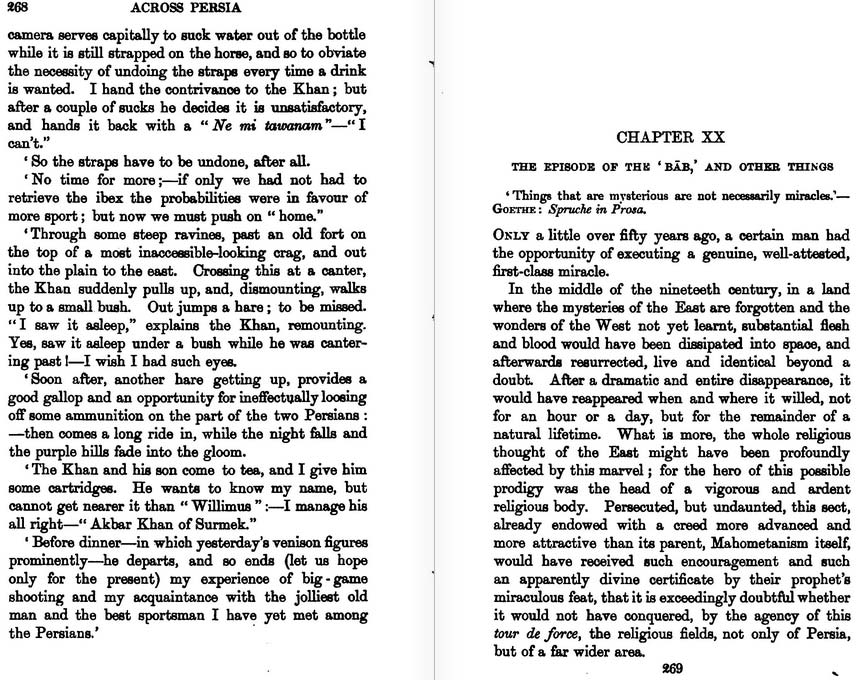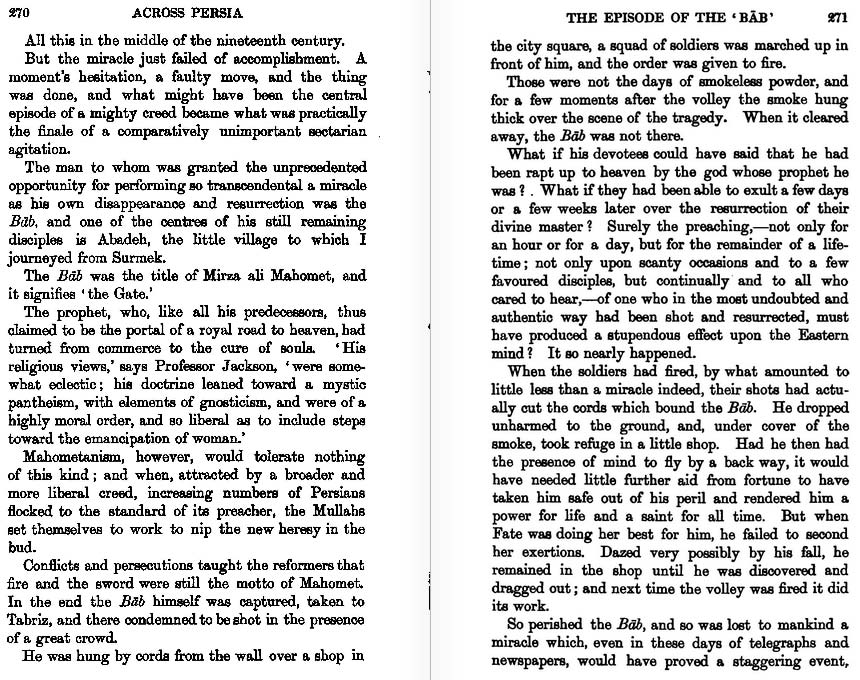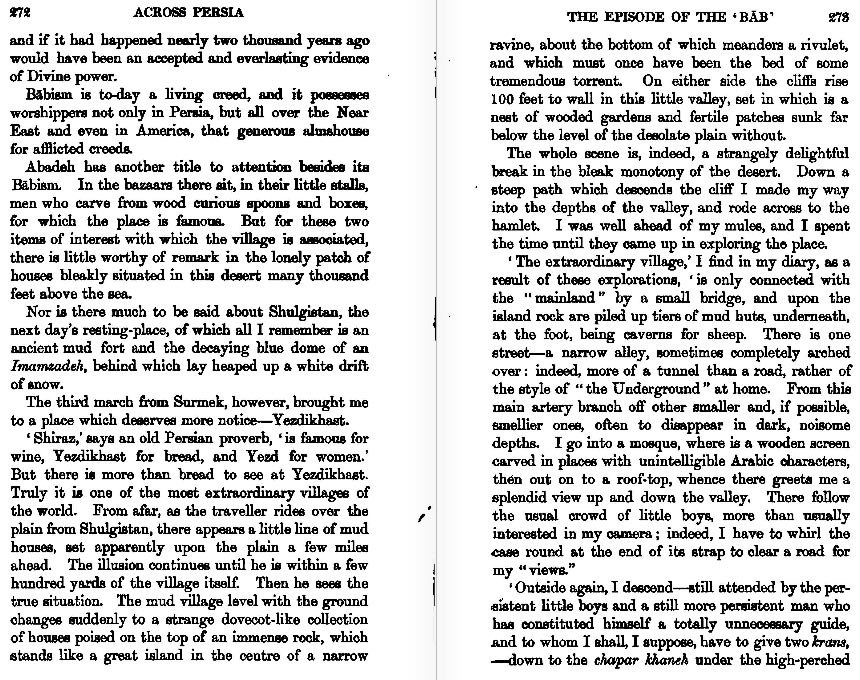
|
|
Abstract: Brief overview of the Báb's execution. Notes: This book is online in a variety of formats at archive.org. |
Episode of The 'Báb'
by E. Crawshay Williams
published in Acoss Persia, pages 269-272London: Edward Arnold, 1907
1. Text
THE EPISODE OF THE 'BAB' AND OTHER THINGS
— Goethe: Spruche in Prosa.
In the middle of the nineteeth century, in a land where the mysteries of the East are forgotten and the wonders of the West not yet learnt, substantial flesh and blood would have been dissipated into space, and afterwards resurrected, live and identical beyond a doubt. After a dramatic and entire disappearance, it would have reappeared when and where it willed, not for an hour or a day, but for the remainder of a natural lifetime. What is more, the whole religious thought of the East might have been profoundly affected by this marvel; for the hero of this possible prodigy was the head of a vigorous and ardent religious body. Persecuted, but undaunted, this sect, already endowed with a creed more advanced and more attractive than its parent, Mahometanism itself, would have received such encouragement and such an apparently divine certificate by their prophet's miraculous feat, that it is exceedingly doubtful whether it would not have conquered, by the agency of this tour de force, the religious fields, not only of Persia, but of a far wider area.
All this in the middle of the nineteenth century.
But the miracle just failed of accomplishment. A moment's hesitation, a faulty move, and the thing was done, and what might have been the central episode of a mighty creed became what was practically the finale of a comparatively unimportant sectarian agitation.
The man to whom was granted the unprecedented opportunity for performing so transcendental a miracle as his own disappearance and resurrection was the Báb, and one of the centres of his still remaining disciples is Abadeh, the little village to which I journeyed from Surmek.
The Bab was the title of Mirza Ali Mahomet, and it signifies "the Gate."
The prophet, who, like all his predecessors, thus claimed to be the portal of a royal road to heaven, had turned from commerce to the cure of souls. 'His religious views,' says Professor Jackson, 'were somewhat eclectic; his doctrine leaned toward a mystic pantheism, with elements of gnosticism, and were of a highly moral order, and so liberal as to include steps toward the emancipation of woman.'
Mahometanism, however, would tolerate nothing of this kind; and when, attracted by a broader and more liberal creed, increasing numbers of Persians flocked to the standard of its preacher, the Mullahs set themselves to work to nip the new heresy in the bud.
Conflicts and persecutions taught the reformers that fire and the sword were still the motto of Mahomet. In the end the Bab himself was captured, taken to Tabriz, and there condemned to be shot in the presence of a great crowd.
He was hung by cords from the wall over a shop in the city square, a squad of soldiers was marched up in front of him, and the order was given to fire.
Those were not the days of smokeless powder, and for a few moments after the volley the smoke hung thick over the scene of the tragedy. When it cleared away, the Bab was not there.
What if his devotees could have said that he had been rapt up to heaven by the god whose prophet he was? What if they had been able to exult a few days or a few weeks later over the resurrection of their divine master? Surely the preaching, — not only for an hour or for a day, but for the remainder of a lifetime; not only upon scanty occasions and to a few favoured disciples, but continually and to all who cared to hear, — of one who in the most undoubted and authentic way had been shot and resurrected, must have produced a stupendous effect upon the Eastern mind? It so nearly happened.
When the soldiers had fired, by what amounted to little less than a miracle indeed, their shots had actually cut the cords which bound the Bab. He dropped unharmed to the ground, and, under cover of the smoke, took refuge in a little shop. Had he then had the presence of mind to fly by a back way, it would have needed little further aid from fortune to have taken him safe out of his peril and rendered him a power for life and a saint for all time. But when Fate was doing her best for him, he failed to second her exertions. Dazed very possibly by his fall, he remained in the shop until he was discovered and dragged out; and next time the volley was fired it did its work.
So perished the Bab, and so was lost to mankind a miracle which, even in these days of telegraphs and newspapers, would have proved a staggering events and If it had happened nearly two thousand years ago would have been an accepted and everlasting evidence of Divine power.
Babism is to-day a living creed, and it possesses worshippers not only in Persia, but all over the Near East and even in America, that generous almshouse for afflicted creeds.
Abadeh has another title to attention besides its Babism. In the bazaars there sit, in their little stalls, men who carve from wood curious spoons and boxes, for which the place is famous. But for these two items of interest with which the village is associated, there is little worthy of remark in the lonely patch of houses bleakly situated in this desert many thousand feet above the sea.
Nor is there much to be said about Shulgistan, the next day's resting-place, of which all I remember is an ancient mud fort and the decaying blue dome of an Imamzadeh, behind which lay heaped up a white drift of snow. ...
2. Image scans (click image for larger version)



|
|